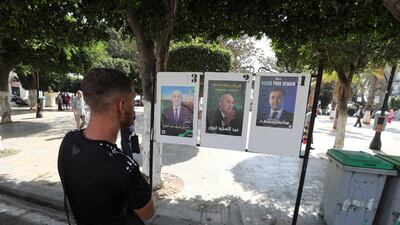Algeria’s presidential election campaigning has ended ahead of polling day on Saturday, with incumbent Abdelmadjid Tebboune seeking a second term five years after a mass uprising toppled his predecessor.
The polls are the first to be held since Mr Tebboune came to power after pro-democracy protests in 2019. They also come at a time of growing voter apathy, as well as regional instability in neighbouring Mali, Niger and Libya.
Mr Tebboune is up against Youcef Aouchiche, of the Socialist Forces Front, and Abdelaali Hassani Cherif, representing the Movement of Society for Peace.
The elections authority said at least 24 million Algerians are eligible to participate, including more than 800,000 living abroad who began voting on Monday. More than 13,000 polling stations will be open throughout the country’s 58 governorates, including 139 mobile stations set up for Bedouin communities and remote villages in the south. Voting in these areas is scheduled to start on Wednesday.
While Algeria seeks a bigger role in regional politics to counter instability in neighbouring countries, domestic economic issues have dominated the political debate more than five years since the Hirak protest movement ousted long-time president Abdelaziz Bouteflika. Thousands of young people took to the streets in the protests of 2019 but many of the movement's leaders have since been jailed.
Turnout is expected to be low, indicating growing apathy towards the political process. Despite economic growth and falling inflation, youth unemployment remains high – at 30 per cent last year, the World Bank said. Only 23 per cent of voters showed up for the most recent legislative elections in 2021, one of the lowest participation rates in Algeria's history.
Who are the candidates?

Abdelmadjid Tebboune, 78, is standing again as an independent candidate. He was elected in December 2019 after the Hirak uprising and fall of the Bouteflika regime, and has long been considered a military-backed figure. He clinched victory in 2019 with a 58 per cent majority against candidates backed by the Democratic National Rally, then Algeria's ruling party, and the National Liberation Front.
He campaigned this time under the slogan “For a victorious Algeria”, touting his government’s achievements on the economy. At a rally in the capital Algiers on Tuesday, Mr Tebboune promised supporters he would continue to focus on economic and social issues, such as unemployment, regional development and the role of young people in decision-making.
Algeria recorded 4.1 per cent growth in GDP last year, the World Bank said. Consumer price inflation dropped from 9.3 per cent in 2023 to 5.0 per cent in the first quarter of this year, primarily due to a decrease in food imports and a growing reliance on domestic agriculture. Observers believe the economic success makes Mr Tebboune favourite, regardless of the perceived political apathy.

Youcef Aouchiche, 41, is a seasoned politician, former journalist and MP. Raised in Tizi-Ouzou, a city predominantly populated by the indigenous Amazigh, he started his career as a student activist while studying political science.
Mr Aouchiche is the candidate for the secular opposition party Socialist Forces Front, which he joined in 2002 before becoming its secretary general in 2020. He was chairman of the Tizi-Ouzou Popular Assembly from 2017 to 2022 before becoming an MP.
He has promised to decentralise power to “representatives in elected councils and involve them in all the country’s fateful decisions”. He also wants “an economic structure that is based on efficiency and transparency” and has pledged to strengthen the welfare state to fully support the “vulnerable and working classes”.
Mr Aouchiche is considered a strong contender. In recent years he has steadily garnered support across central Algeria, notably in the Kabyle region, which is home to 7 million people.

Abdelaali Hassani Cherif, 57, is a civil engineer who also holds a degree in administrative and legal sciences. A native of Magra city in the Msila governorate, south-east of Algiers, Mr Cherif also started his political career as an activist at the University of Msila. He was involved from a young age in the Movement of Society for Peace, an Islamist party, which he is representing in Saturday's election.
Mr Cherif entered Msila governorate's legislature in 1995 and was its vice president from 2002 to 2007, before winning election to the Algerian Parliament that year.
Like his opponents, Mr Cherif has based his presidential campaign on socio-economic promises, pledging “development, stability and prosperity” for all. At a gathering in Algiers on Tuesday, he promised to pursue “development policies that operate in accordance with the principle of social justice and equal opportunities”, as well as a "fair distribution of wealth”.


